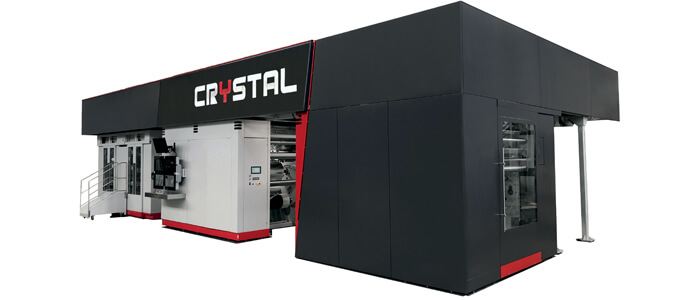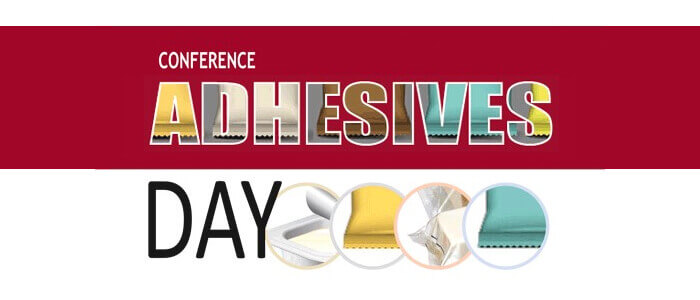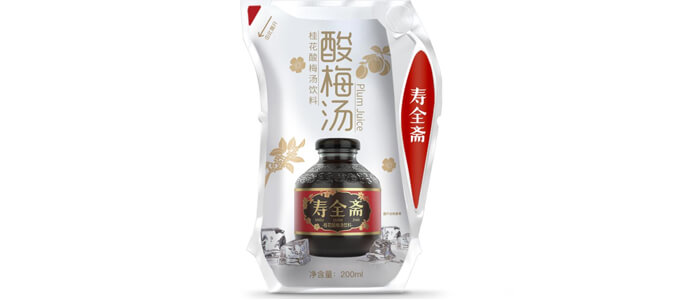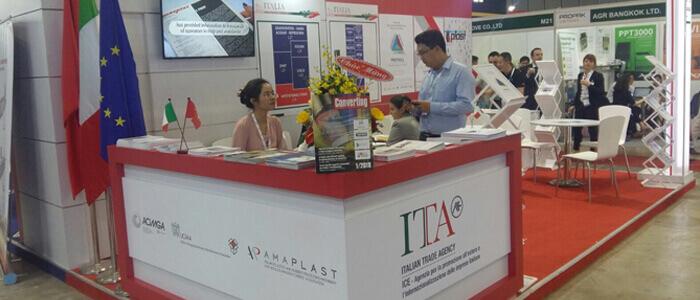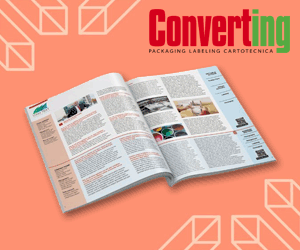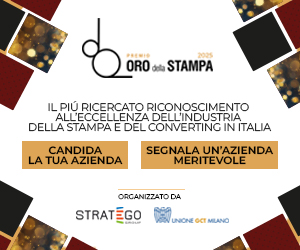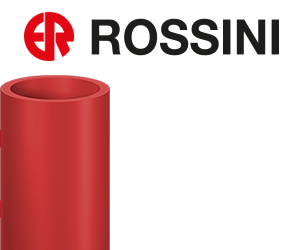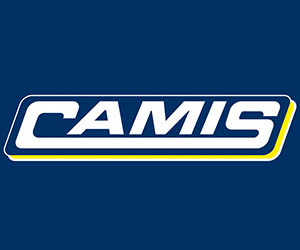The vision of the market, the new projects and the new management of a group that has accelerated investments in digitalization and service to respond to the needs born from the pandemic. And which is pushing “green” innovation in the printing and laminating of the new sustainable materials.
At first sight Alessandro Bellò and Alessandro Bicego appear very different, in terms of temperament and the way they relate to people. But when the conversation starts and the passion for the topics at stake takes the upper hand, the similarities and the complicity born from their collaboration emerge. This is what is what comes across from two managers just appointed by Aldo Peretti – Chairman, CEO and second shareholder of Uteco Group: Alessandro Bellò, global head of sales, services & marketing since June and Alessandro Bicego, head of Innovation since September. In this interview they have agreed to tell us what they think about flexo printing and much more besides, in these pandemical times.
Dr. Bellò, how is the market of printing and converting machines, and of flexo in particular, going for Uteco?
The 2020 balance sheet still hasn’t been closed (the interview was made in mid-January, Editor’s note) but we can be satisfied: if the average losses of the sector stand at -15/20% and above, Uteco should end the year with single-digit decline, thanks aboveall to the good performances of the last quarter. And during the current year we count on improving these results, working with a view to recovering 2019 volumes.
What’s happening on the markets?
Unfortunately the pandemic is still in full swing and much of the world is paying for the inadequacy of the measures taken previously: a lot of countries are experiencing today what Italy went through last semester and the Covid pressure at a global level is strong. Having said that, we are probably also getting used to the idea that we have to live with this virus and the dynamics of investment could take on a more orderly and less volatile course.
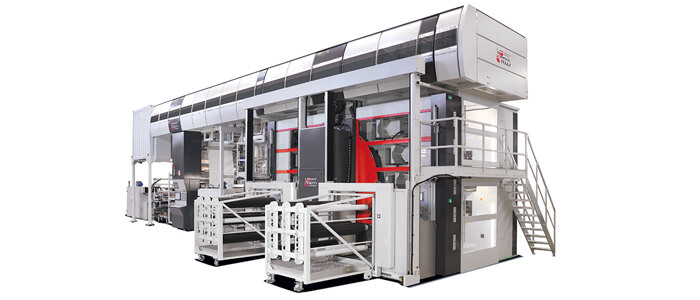
What are the factors that most affect investments in printing presses?
For Italy, the most obvious ones are the weakness of the political system and, on the positive side, the confirmation of funding to support industrial investments. As for the rest of Europe, the East European countries do not know if they will be able to count on EU funds, now that everyone is in trouble and resources could be distributed differently. While the center-north is experiencing similar dynamics to ours, with the manufacturing industry negatively affected by the blockage of the horeca channels and socio-cultural activities, but also with the great impulse given to the packaging sector by the boom in e-commerce. Let’s say that in general we expect a rebound, albeit modest, both in Italy and in the EU area.
And in the rest of the world?
The fate of the USA obviously depends on the decisions of the new administration, and not only in terms of foreign trade but also in terms of the (feared) increase in corporate taxation. While Latin America, while remaining an area of a fairly good potential, in addition to being hard hit by Covid, is now more than ever suffering from inflation and political instability.
Asia, which was showing increasing interest in flexographic technology, is experiencing different dynamics…
Yes, and we will focus more and more on Asia, which until yesterday stayed a bit in the background in Uteco’s internationalization projects. At the moment, however, although it seems to be less affected by the pandemic, working there is as difficult as in other parts of the world: if in China, once entered, one can move without restrictions, in the other countries of the Far East travel bans between nations are still in force and, if things continue in this way, our local collaborators, although widely present, will still struggle this year.
Which application sectors are most likely to invest?
Food & beverage and pharma, together with personal- and homecare. On the other hand, the cosmetics mix and, more generally, the products associated with relations between people are seen to be in a downward slide.
Ingegner Bicego, how does all this affect Uteco Group’s offer and projects?
First of all, it has generated a strong acceleration in R&D investments: this has been an immediate decision to respond to the new needs of a rapidly changing market. This timeliness – distinctive trait and peculiar strength of Uteco – has allowed us to turn prevailing problems into a driving force for innovation, forcing a digitalization that has changed our offer.
Uteco was already operating in the “4.0” horizon. What has changed?
First of all, priorities. Remote assistance has become a must, as we know, and digitalization has allowed us to continue to serve customers all over the world, even in the worst months. And generally speaking, it has created small revolutions on a cultural level as well, where a series of practices that were previously considered second-rate have now become not only indispensable but also “smart”, such as the management of videoconference meetings: if you don’t know how to use Zoom, you’re out of business these days.
Have the objectives of sustainability and productivity, so important until yesterday, taken a back seat?
Certainly not! Uteco has invested more, not subtracting resources from the other primary objectives. Perfecting the machines so they can handle new substrates – such as recycled ones, which are much more difficult to process – is a never-ending task. Just like the tests on customers’ materials that we carry out in the Demo Center: an aspect of R&D that generates an unparalleled competitive advantage, fed by the wealth of information generated by the dialogue with thousands of operators, each with their own experience, vision and project. Whoever comes to us with a question knows that they will find a state-of-the-art answer, favored by Uteco’s “cross-technological” knowhow, by the collaboration with other NB Renaissance companies – such as Novamont, a very precious partner – and by the contributions of other operators along the supply chain.
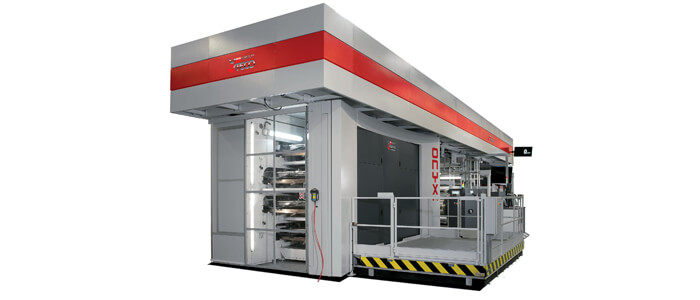
Which projects do you consider strategic?
With Covid, the flexibility and speed of response of the machine and its capacity of inter-row “dialogue”, aimed at improving the time to market, jumped to the forefront: the sudden peaks of demand for many products during the first lockdown show the reason. And then I’d like to mention, as a particular source of pride, the innovations large and small, that increase operator comfort and safety: these are aspects to which we have always dedicated the utmost attention and on which our machines are really ahead. On the other hand, I can’t anticipate anything about the more radical innovations we’re working on in view of new technological and performance horizons, but I can announce great news.
What about packaging? How is it changing?
During this year we have seen the birth of new, sustainable laminates, and a multiplication of coatings to enhance packaging not only in terms of aesthetics but also in terms of antibacterial properties, or to give monomaterial substrates the necessary barrier properties… All this could not take place without the appropriate machines. And it has accelerated the tendency to hybridize the lines with more technologies, something that – I would like to underline – we have been doing in Uteco for twenty years: having all the technologies in house makes it “easier” to harmonize speed, tension, rejects, drying modalities and whatever else is needed to realize a hybrid machine. With an observation: from this point of view as well, the flexibility of flexo technology, not by chance mentioned in the name, gives it unparalleled advantages.
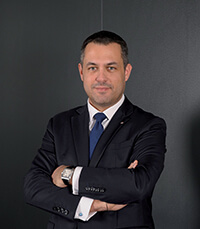 Alessandro Bellò came to Uteco after having worked 20 years for a German multinational group, leader in the production of highly automated systems for food packaging. During this experience he held several managerial positions, not only in Europe but also in America and Asia Pacific, where he spent more than 10 years. At the end of 2019, he accepted the offer to serve as Chief Commercial Officer of the Uteco Group, with global responsibility for sales, services & marketing, and to join the Board of Directors and the corporate ownership structure. By the time he took office in June 2020, Covid had already disrupted economic and social dynamics worldwide. “The assignment was challenging, and I like challenges, but approaching a new company in the midst of a pandemic crisis multiplied the difficulties tenfold,” Bellò says. “However, Uteco is a concern with great projects. And the private equity fund NB Renaissance, which acquired control in 2018, in addition to strengthening its financial solidity pursues the growth of the group along internal and external lines, envisaging new developments on international scale.”
Alessandro Bellò came to Uteco after having worked 20 years for a German multinational group, leader in the production of highly automated systems for food packaging. During this experience he held several managerial positions, not only in Europe but also in America and Asia Pacific, where he spent more than 10 years. At the end of 2019, he accepted the offer to serve as Chief Commercial Officer of the Uteco Group, with global responsibility for sales, services & marketing, and to join the Board of Directors and the corporate ownership structure. By the time he took office in June 2020, Covid had already disrupted economic and social dynamics worldwide. “The assignment was challenging, and I like challenges, but approaching a new company in the midst of a pandemic crisis multiplied the difficulties tenfold,” Bellò says. “However, Uteco is a concern with great projects. And the private equity fund NB Renaissance, which acquired control in 2018, in addition to strengthening its financial solidity pursues the growth of the group along internal and external lines, envisaging new developments on international scale.”
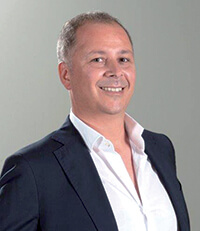 Alessandro Bicego in September 2020 was appointed head of Innovation for the Colognola ai Colli group. His career path differs totally from that of Bellò’s, with whom he has established excellent synergical relations: his professional growth, hinged on a solid technical training, has occurred entirely within Uteco. “In this company I started working as project manager, then on special projects, subsequently being appointed project manager for the different business units, gaining experience in all printing technologies – flexo, grater, digital and offset – and in coating and lamination. Today, I coordinate Uteco’s Innovation Managers in analyzing market needs, sharing experiences and competences in order to multiply the synergies among the different product families”. With a strength that generates responsibility: “Printing is not studied at university; we, the manufacturers, have to see to that along with our supply chain partners. And we must rise to the epochal challenges posed by social, environmental and economic sustainability,” says the technician-communicator who we saw in action during the recent “virtual” open house on the Dualam project.
Alessandro Bicego in September 2020 was appointed head of Innovation for the Colognola ai Colli group. His career path differs totally from that of Bellò’s, with whom he has established excellent synergical relations: his professional growth, hinged on a solid technical training, has occurred entirely within Uteco. “In this company I started working as project manager, then on special projects, subsequently being appointed project manager for the different business units, gaining experience in all printing technologies – flexo, grater, digital and offset – and in coating and lamination. Today, I coordinate Uteco’s Innovation Managers in analyzing market needs, sharing experiences and competences in order to multiply the synergies among the different product families”. With a strength that generates responsibility: “Printing is not studied at university; we, the manufacturers, have to see to that along with our supply chain partners. And we must rise to the epochal challenges posed by social, environmental and economic sustainability,” says the technician-communicator who we saw in action during the recent “virtual” open house on the Dualam project.

